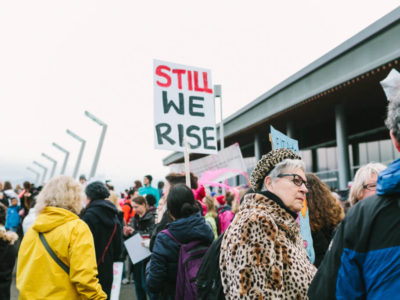Feminism. This word carries so many opinions. Its definition seems to range depending on the person speaking about it. But at its simplest form, I see it as equality of all sexes. No matter your gender, sexuality, race or ethnicity, all humans should have the same opportunities.
In middle school, I discovered the definition of feminism. I randomly picked up Gail Collins’s When Everything Changed: The Amazing Journey of American Women from 1960 to Present. Her ideas included concepts I had yet to completely understand, like the importance of equal pay and having the rights to one’s body.
As a woman, when I finally start my career I want to receive equal compensation. And I don’t want my body to fall into the government’s hands. Intrigued with the history and realities women face, I knew this would stick with me.
I spent my free time researching feminist icons, watching documentaries on women’s issues and explaining to my friends what this new-to-me idea meant for the female population. I firmly believed these new ideas I learned from Collins should come up in the classroom. But at 13, the topic didn’t seem as appealing to some as I’d hoped. I knew I didn’t have all the answers on fighting the patriarchy, but I attempted to bestow what I did know.
Exploring feminism alone at that age created an absence of intersectional concepts that I could create with other women on the same path of learning. I knew from Collins’s book the issues white women faced in America. But I didn’t know about what black, native, Muslim and Asian women deal with in their daily lives. I desired to extend my knowledge in that aspect of feminism. It’s impossible to go through life and not notice differences. But I had to understand the way in which they impact how women experience oppression and discrimination.
Continuing my education at the University of Florida, I knew I would pursue women’s studies. I felt confident the minor would better immerse me into the realities of diverse women around the world. I wanted to study something I felt passionate about—isn’t that what college is for?
And I got what I asked for. My women’s studies courses were truly diverse. A simple hello led to meeting multiracial, Muslim, Asian and transgender women. From these friendships, I learned the struggles of a language barrier after moving to America, the stereotypes women receive for wearing a hijab and the reality of transitioning sexes.
I saw the journey of women taking place right in front of me, similar to the one Collins outlined in her book. But this time, it included all women. Our experiences in life may seem different, but that doesn’t mean we can’t connect.
My newfound education on diverse backgrounds allowed me to see what feminism truly stands for in regards to all women. It’s easy to see on the news how women around America fight for their rights and advocate for others. Witnessing it in action revealed its differences on a personal level. Feminism isn’t a straight path for a single group of people to follow, but many individual paths that deserve our attention.
The first thing my women’s studies courses taught me were to always respect other people’s opinions and stories. These difference gave me a better understanding of the world, my new community. I’m able to grow personally, not only through classes, but also through connections with other women.
Sitting in the grass at Plaza of the Americas with a group of women could feels like cracking open a textbook for the first time. Through pure listening, I found common ground with so many women that I now call friends. We talk about anything from surface level topics, like the latest trends in Hollywood, to more serious issues, like the events taking place in our nation’s capital and the lingering negative labels that exist in our country.
I will never know the reality of people telling me they cannot understand my English or told to use the bathroom assigned with my birth sex. But I want to know these stories so I can inform others that these persisting stereotypes latch onto actual human beings.
I can’t walk in these women’s shoes, but storytelling reveals so much. These diverse millennial women that I meet every day can all teach me something new. Listening to their stories helps me understand their struggles.
This has only made me more vocal in my beliefs and active in my community. I want to fight and stand by all women—not just the ones with a privileged platform in society.
Not everyone will take a women’s studies course or have the audacity to speak with someone they don’t know. At the very least, listen to others because you never know who you’ll meet and what you’ll learn. The journey of all women continually evolves, just like my understanding of it since stumbling across the definition years ago.



















